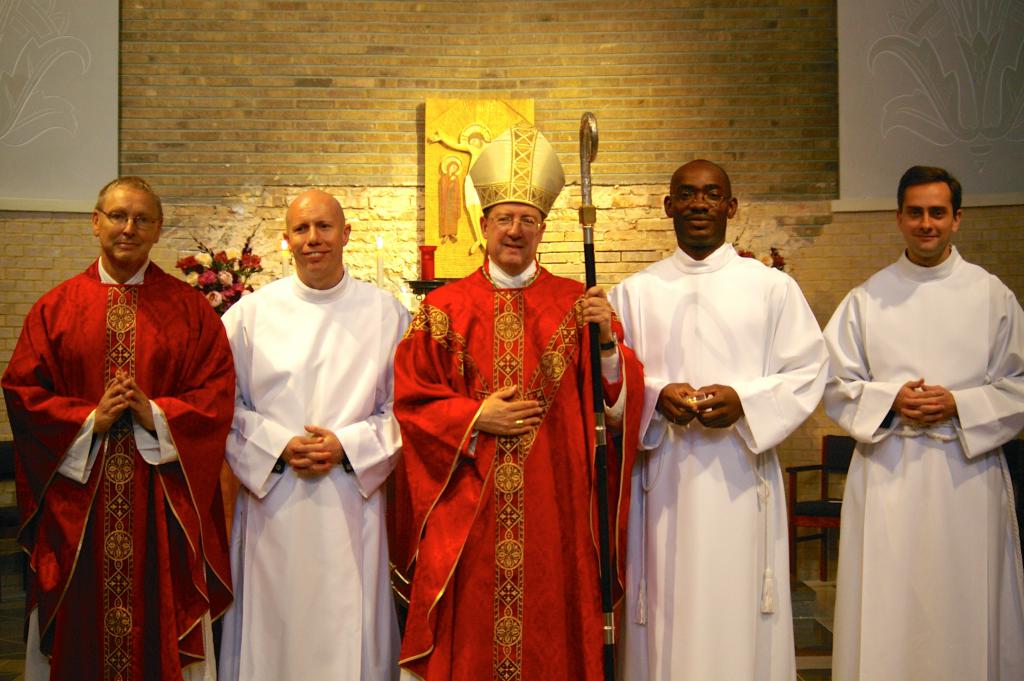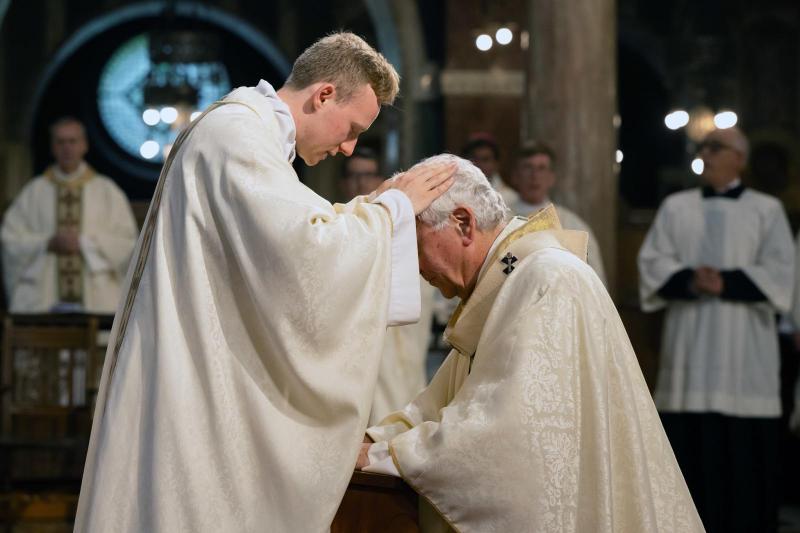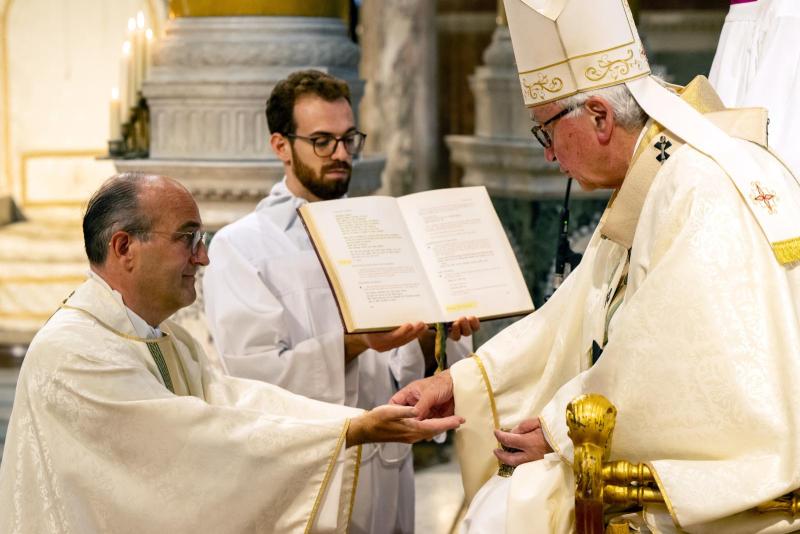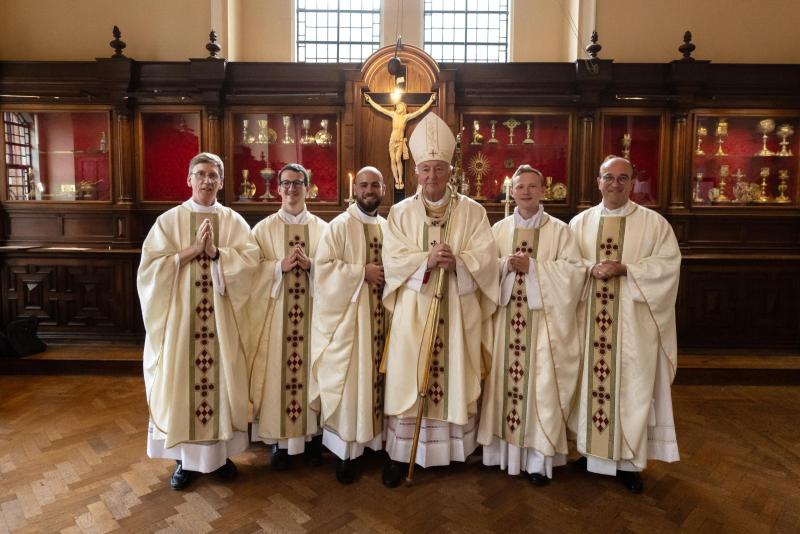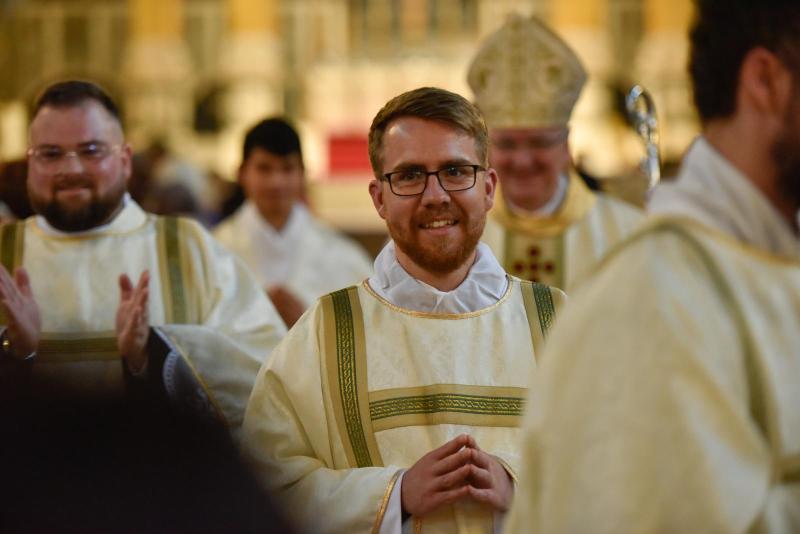On the Feast of St Luke, 18 October 2014, Bishop John Sherrington conferred the ministry of acolyte on three seminarians, Joseph Okoro, Damian Ryan, and Tony Thomas, during Mass at Allen Hall, the Diocesan seminary.
Dating back to ancient times, this ministry is ‘among the particular offices to be preserved and adapted to contemporary needs’. The acolyte is appointed to attend to the service of the altar and to assist deacons and priests in liturgical celebrations.
In addressing the candidates for the ministry in his homily, Bishop John explained, ‘As you enter into the ministry of acolyte, your sharing at the altar with the priest and deacon, means that you are called to conform yourselves more closely to Christ’s mystery on the cross and to seek to know more deeply his love for you.’
The acolyte is also entrusted with distributing Communion as a special minister, especially to the weak, sick and dying.
Bishop John went on to emphasise the significance of this duty, ‘The ministry to the sick and the dying is a great gift which you must love and savour. As you bring the gift of Christ’s body and blood to those who are sick and housebound, to the elderly and the frail, you will see the sacredness of these moments.’
He also spoke of those, who like the disciples on the road to Emmaus, are downcast: ‘They are walking into the night and do not see any hope as they struggle to grasp the meaning of Good Friday. You too will meet people in their ‘night of the soul’, perhaps in illness, loneliness, in tragedy or in confusion. Just as the two disciples recognised Jesus in the breaking of the bread, your ministry at the altar and in bringing to the hungry the bread of life will help the Lord to reveal himself to them and deepen his life within them.’
At the end of Mass, Bishop John blessed the pyxes which the acolytes will use to take Holy Communion to the sick and dying.
The ministry of acolyte is one of the milestones along the journey of a seminarian in formation for the priesthood. Please keep these men and the other seminarians in your prayers.
The full text of Bishop John's homily:
In the Gospel of the feast of St. Luke, Jesus sends out the 72 disciples and tells them that their greeting to others must be “Peace be with you”. These words offer reassurance and hope. Whilst they may be either accepted or rejected, the disciples are to keep offering this word of peace to a people who are in need and to invite them to know God’s love towards them and the gift of the Kingdom of God.
For those of you who today will receive the ministry of acolyte, this greeting is particularly appropriate. The words ‘Peace be with you’ remind you of the gift of reconciliation which is offered to us by God every time we celebrate the Mass together. We enter again into the salvific mystery of Christ on the cross, through which Christ extends to each one us the gift of peace which speaks of mercy of reconciliation. We are then called to share this gift and its promise with others.
As you enter into the ministry of acolyte, your sharing at the altar with the priest and deacon, means that you are called to conform yourselves more closely to Christ’s mystery on the cross and to seek to know more deeply his love for you.
We hear this expressed in the prayer over the gifts: “Grant through your heavenly gifts that we may serve you in freedom of heart, we pray, O Lord, so that the offerings we make on the feast of St. Luke may bring us healing and give us glory.”
Cherish the gifts of his body and blood and hunger to receive them so that you may have true life. The words of the prayer Anima Christi (Soul of Christ….) particularly invite you to model your life on this mystery. Imitate his love in bringing to others this gift of peace and its joy. In the words of the psalm response: “Your friends O Lord make known the glorious splendour of your reign.”
In the ministry of acolyte you will bring holy communion – the gift of Christ’s body and blood – to those who are sick and in need of strength and healing. As we hear again in the gospel, the disciples are told to enter a village and ‘cure those in it who are sick, and say, ‘The Kingdom of God is very close to you.”
The ministry to the sick and the dying is a great gift which you must love and savour. As you bring the gift of Christ’s body and blood to those who are sick and housebound, to the elderly and the frail, you will see the sacredness of these moments. These people are the poor who are very close to the Lord and who will teach you of God’s love by their reverence and love for him. Treasure these sacred and precious moments when the Lord enters their bodies and gives the gift of his self to those who are in need.
To the dying to you will bring holy communion as viaticum, food for the journey to heaven. As Jesus says, “‘I am the bread of life. Whoever comes to me will never be hungry, and whoever believes in me will never be thirsty… 40This is indeed the will of my Father, that all who see the Son and believe in him may have eternal life; and I will raise them up on the last day.’ This food will strengthen them in their last agony, feed them for the journey and assure them of the presence of the Church. Whether in the day or in the middle of the night, always be generous and loving – a grumpy look or word of judgement will never be forgotten. You are called to show forth God’s love and mercy towards the needy as acolytes entrusted with this ministry by the Church.
St. Luke describes the two disciples walking down from Jerusalem towards Emmaus their hearts downcast. They are walking into the night and do not see any hope as they struggle to grasp the meaning of Good Friday. You too will meet people in their ‘night of the soul’, perhaps in illness, loneliness, in tragedy or in confusion. Just as the two disciples recognised Jesus in the breaking of the bread, your ministry at the altar and in bringing to the hungry the bread of life will help the Lord to reveal himself to them and deepen his life within them.
May you always trust and be confident in the power of the Lord to save and raise up those who cry out to him in their need.
Bishop John Sherrington
